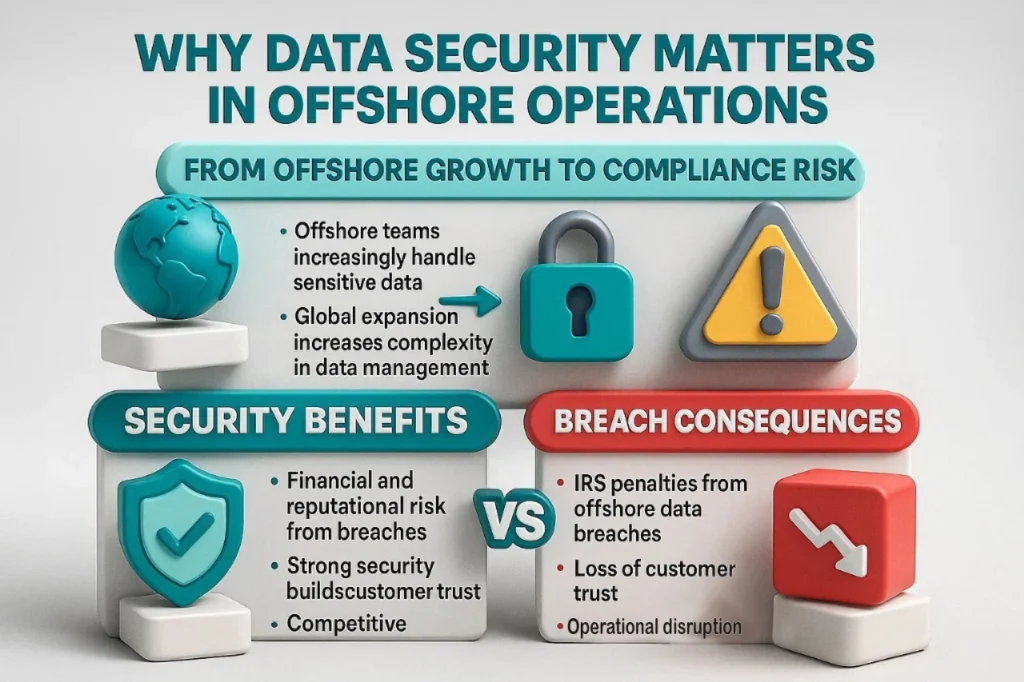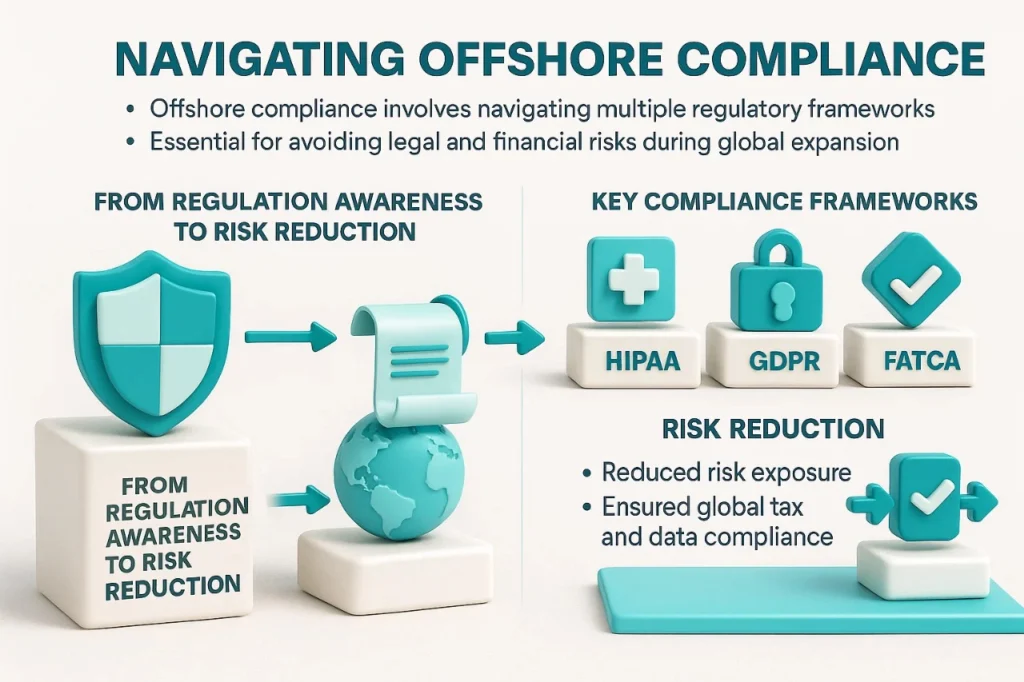Did you know that 60% of organizations with offshore teams have experienced a data breach? As more businesses use offshore teams for sensitive data, keeping this data safe is critical.
Rules like HIPAA for health data and GDPR for European data make it a must to protect sensitive information. Knowing the risks with offshore teams and acting early to prevent them is essential.

More companies are using offshore teams for important data tasks. This makes strong data security even more critical. As businesses grow globally, handling sensitive data becomes more complex, mainly in offshore tax reporting and compliance.
Handling sensitive data worldwide is a big challenge. It includes following IRS rules and keeping up with offshore compliance programs. Companies must tackle these issues to meet tax rules without risking data security.
Strong security is not just a rule; it’s essential for business. Without it, companies face big financial and reputation losses. A solid security plan can also build customer trust and give a market edge.
Security breaches can cause huge problems, like big fines and lost customer trust. For example, a data breach in offshore tax reporting can lead to severe IRS penalties. Here are some examples of what can happen:
Consequence | Impact | Example |
Financial Penalties | Significant fines and legal costs | IRS penalties for non-compliance with disclosure requirements |
Reputational Damage | Loss of customer trust and brand reputation | Publicized data breaches leading to customer distrust |
Operational Disruption | Business interruption and loss of productivity | System downtime following a security breach |
Knowing these challenges and outcomes helps businesses make better data security plans. This ensures they follow rules like offshore compliance programs and tax regulations.

Offshore compliance is complex and requires knowledge of many rules. As you grow globally, knowing and following these rules is key. It helps avoid legal and financial problems.
Healthcare groups must follow the Health Insurance Portability and Accountability Act (HIPAA) for offshore data. They need to use strong security to protect patient data.
If you handle data from EU citizens offshore, you must follow the General Data Protection Regulation (GDPR). This rule sets strict data protection rules and can lead to big fines if not followed.
Different fields have their own rules. For example, banks must follow the Foreign Account Tax Compliance Act (FATCA). This means they have to report foreign bank accounts to the IRS.
Offshore providers often need special certifications. These prove they meet international data and security standards. This protects your data.
By knowing and following these rules, you can lower risks in offshore work. This ensures global tax compliance and keeps your data safe.
Offshore teams must focus on strong security to keep data safe and build trust. A company in the Philippines showed it’s possible to handle sensitive data securely. They achieved HIPAA-compliant billing operations.
The main issue was keeping protected health information (PHI) safe during international transfers. They had to set up strict security steps to avoid data breaches and follow HIPAA rules.
To solve this problem, the company used encryption, access controls, and regular security audits. These steps made sure PHI was safe while moving and when stored.
Security Measure | Description | Benefit |
Encryption | Protecting data both in transit and at rest | Prevents unauthorized access |
Access Controls | Limiting access to authorized personnel | Reduces risk of insider threats |
Regular Security Audits | Identifying and addressing vulnerabilities | Ensures ongoing compliance and security |
The results were impressive, with zero data breaches and a 30% cut in costs. This shows offshore teams can manage sensitive data safely and efficiently. They can meet rules like HIPAA with the right security steps.

In Eastern Europe, GDPR compliance is key for global recruitment. It helps keep trust and avoids legal trouble. Your recruitment must follow GDPR to protect candidate data and stay ahead.
Handling candidate data under strict privacy laws is a big challenge. Companies must protect personal data during recruitment. This means strong data protection and training on GDPR.
The answer is privacy-by-design recruitment systems. These systems protect data at every recruitment stage. This way, companies keep candidate data safe and follow GDPR.
This leads to a fully compliant talent acquisition framework. Companies can manage candidate data safely, following GDPR. This lowers data breach risks and boosts the company’s reputation.
GDPR Compliance Aspect | Pre-GDPR Implementation | Post-GDPR Implementation |
Candidate Data Handling | Manual, unsecured processes | Automated, encrypted processes |
Data Breach Incidents | Frequent | Zero |
Compliance Status | Non-compliant | Fully compliant |
By using GDPR-compliant recruitment, Eastern European companies avoid legal trouble. They also build a strong reputation for data protection. This case study shows how important GDPR is in recruitment, making talent acquisition safe and reliable.
A thorough risk assessment is key for safe offshore operations. When dealing with international business and offshore banking rules, spotting data handling weaknesses is vital.
Look closely at all parts of your offshore work, like data storage and how you send it. Find out where hackers could get in. Make sure you follow tax haven and tax rules well.
After finding weak spots, figure out how big the risks are. Think about how a breach could hurt your business financially and reputation-wise.
Now, plan how to fix these risks. Your plan should say how to tackle each weakness, like using better encryption or doing security checks often.
Risk Category | Likelihood | Impact | Mitigation Measure |
Data Breach | High | Severe | Enhanced Encryption |
Compliance Failure | Medium | Moderate | Regular Audits |
By using this method, you can keep your offshore work safe and follow the rules.
Before you start working with offshore teams, it’s key to do a deep check. This ensures your operations are safe and follow the rules. You need to look at a few important steps to see if your future partners are trustworthy.
First, check the security credentials and certifications of the teams you’re thinking about. Look for international security standards and things like ISO 27001. It’s important to make sure they follow these rules to keep your data safe and follow IRS regulations and foreign reporting requirements.
Next, check their physical and digital security setup. Look at their data centers, network security, and how they control access. A strong security setup is key to keeping your data safe and following the rules.
It’s also important to have clear contracts and rules for who’s responsible. Your contracts should cover data protection, what to do in case of a breach, and who’s liable for security issues. This helps manage risks and makes sure you follow tax compliance services.
By using this checklist, you can make sure your offshore teams can handle your data safely and follow the rules. This helps protect your business from risks.

Keeping your IT infrastructure secure is key when managing teams that deal with sensitive info. As you handle global operations, a strong security framework is vital. It helps you follow rules like offshore tax and foreign account compliance.
A solid cloud security setup is the base of a secure IT system. It includes strong access controls, watching data flows, and following cross-border rules. Cloud security helps keep your data safe from hackers and breaches.
Good access control and authentication are key to stopping data breaches. Using multi-factor authentication, role-based access, and regular security checks boosts your security. These steps make sure only the right people get to sensitive info, helping with offshore reporting.
Encryption is key for keeping data safe. Encrypting data in transit and at rest protects it from hackers. Using top encryption protocols keeps your data private and safe.
Centralized security management has many perks. It improves how you handle incidents, monitor, and report on compliance. It helps manage risks better and follow rules, like foreign account compliance.
“A centralized security management system is not just a tool, it’s a strategic imperative for distributed teams handling sensitive data.”
By adding these parts to your IT setup, you create a safe and compliant space for your teams. This protects your company’s assets and builds trust and reliability worldwide.
When you grow your business worldwide, keeping your offshore teams safe is key. You need strong security to keep your data safe from hackers. Good communication is vital for keeping your operations safe and following the law.
Using encrypted messaging apps and video calls can make your communication safer. Apps like Signal and Wire, and tools like Zoom or Skype, keep your talks private. Make sure the platform you choose meets global data protection rules.
For sharing documents safely, pick tools with strong encryption and control, like Dropbox or Google Drive. These tools let you share files with your teams while keeping them safe. Make sure the tool you choose follows laws like GDPR in Europe.
Creating clear security policies and training your teams is critical. Your policies should cover how to use tools, handle data, and what to do in emergencies. Training helps your team understand the importance of security and how to keep it.
Security Measure | Description | Compliance Benefit |
Encrypted Messaging | Protects text and voice communications | Enhances offshore business compliance |
Secure Document Sharing | Controls access to sensitive documents | Supports foreign income disclosure regulations |
Video Conferencing Encryption | Secures virtual meetings | Aids in maintaining confidentiality for offshore tax havens |

Expanding globally means keeping your offshore facilities safe. This requires strong access controls, clean desk policies, and secure devices.
Strong access controls are key. Use biometrics, card readers, and cameras to watch and control entry. For example, some places use eye scans and PINs for top-secret areas.
A clean desk policy keeps sensitive info safe. Employees should clean their desks and store papers in safe places. Also, keep USBs and CDs locked up tight to stop unauthorized access.
BYOD policies mean all devices must be secure. Use device encryption, keep software up to date, and have secure login methods.
Check your offshore office’s security against FATCA rules. Meeting these standards helps protect your business and keeps you in line with FATCA compliance and IRS reporting. Regular checks and audits keep your security high.
Keeping AI teams safe is a big challenge. It needs strong security and careful planning. As AI helps businesses grow, companies must guard their secrets from hackers.
Companies face a big hurdle in keeping their AI secrets safe. Losing this info could hurt their finances and reputation a lot.
One way to solve this is to use separate work areas for AI teams. Only those who should see the data can. Also, checking code often helps spot and fix security issues.
With these steps, companies can innovate safely and keep their ideas safe. This keeps them in line with tax laws and builds a secure work culture.
Working with remote AI teams adds extra security needs. Things like encrypted chats and safe file sharing are key. This way, companies can protect their data and use talent from all over.
Securing offshore teams with sensitive data is vital. As you handle global operations, building a strong security culture is key. This means setting up solid security steps and following offshore compliance rules.
A lasting security culture needs constant risk checks, safe IT, and clear communication. Focus on cross-border compliance and global tax compliance to keep data safe. Using tax compliance services can also make things easier.
Putting security first helps protect your business and reputation. This means regular training, audits, and updates to your security plans. Remember, a strong security culture is essential for success in global operations.
Offshore teams must follow rules like HIPAA for health data and GDPR for European data. They also need to meet specific standards, like PCI-DSS for payment info.
To meet international tax laws, know the tax rules in the countries your team works in. This includes FATCA reporting and tax treaties. You might also need to file with the IRS, like FBAR for financial accounts.
A detailed risk assessment is key. It finds data handling weaknesses, measures risks, and plans how to fix them. This keeps data safe and follows the law.
Check their security certifications, like SOC 2 or ISO 27001. Also, audit their security setup and review their contracts. This ensures they're secure and reliable.
Use encrypted messaging and video calls. Choose secure document sharing tools. Make sure everyone knows and follows security policies.
Ensure facilities have access controls, surveillance, and clean desk policies. Check their device security too. This keeps the office safe and compliant.
Use privacy-focused recruitment systems. Handle candidate data carefully under strict privacy laws. Have clear data protection policies and procedures.
Not following tax reporting rules can lead to big penalties and fines. It also harms your reputation. Always report on time and accurately.
Use segmented environments and code reviews for AI teams. Control access tightly. Consider special needs for remote AI developers.
A strong security culture protects data and builds trust. It covers compliance, risk, IT security, and communication. This makes your business secure and reliable.
Join thousands of businesses leveraging offshore staffing to scale their operations globally
Expand effortlessly with My Offshore Employees - access top 1% offshore talent starting at just $3/hr or $600/month per FTE. No hidden fees, no compromises on quality. Your offshore employees work exclusively for you - ensuring focus, transparency, and real-time visibility into your projects. We combine smart automation and proven industry experience to deliver higher productivity, fewer errors, and tailor-made solutions for your business growth.

© 2022-Present MyOffshoreEmployees.com – A brand of iWebGenics Pvt. Ltd. (India)